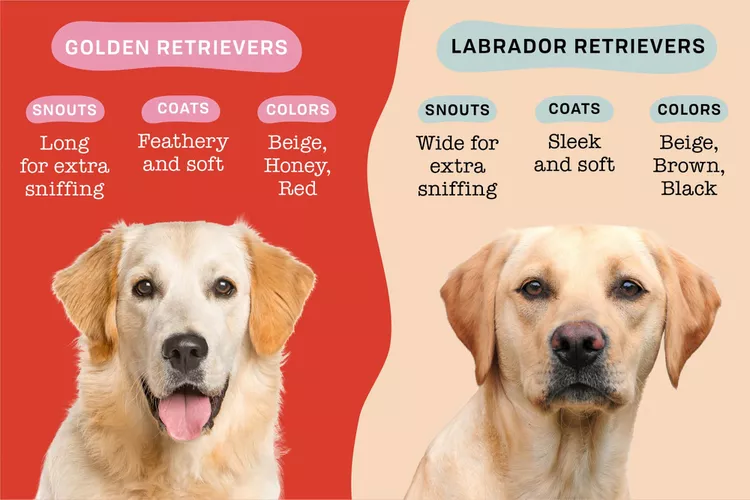Scrolling through photos of adorable puppies or sweet rescue dogs can help you find the perfect pooch pal, but it can be difficult to decide between two similar breeds, like labrador retrievers vs. golden retrievers.
Goldens and Labs are both part of American Kennel Club (AKC) ‘s sporting group, and as retrievers, they are often exceptional outdoor companions, exercise buddies, and family members.
We talked to Jo Myers, DVM, of Salida, Colorado, a telehealth practitioner on Vetster, to get the lowdown on the similarities and differences between golden retrievers and Labrador retrievers, plus how to know which one is right for you.
Labrador Retriever vs Golden Retriever: Similarities
“The variations and similarities between individual dog personalities are much more significant than any breed generalizations,” she says. “But in general, all types of retrievers want humans they can share hobbies with, enjoying things like hiking, running, flyball, agility trials, frisbee, obedience training, and so on.”
Other similarities include:
- Goldens and Labs live best in an environment with more space, such as a large fenced backyard.
- They’re super pets for families with children, especially when socialized at a young age.
- They both do well with other pets, too.
- As retrievers, they’re usually good swimmers because they were bred to fetch waterfowl for hunters. But training them to swim is still essential to keep them safe.
- Both breeds live approximately 10–12 years.
Myers says goldens and Labs share health concerns such as allergies, and joint problems like knee and hip dysplasia. Individually, Labs are prone to obesity, and golden retrievers to congenital heart defects and cancer.
Labrador Retriever vs Golden Retriever: Differences
Although they’re retriever cousins, Labs and goldens are from separate parts of the world. Labrador retrievers originated on the island of Newfoundland in the most eastern province of Canada, Labrador. Interestingly, there are actually three types of golden retrievers, hailing from Britain, the United States, and Canada, respectively.
When you see these dogs cozied up by one other, especially a yellow or golden Lab and a golden retriever, there’s a slight sporting dog family resemblance, but also key points to help tell them apart.

One difference between golden retrievers and Labrador retrievers is their muzzle shape: goldens’ are more narrow with a lean jaw, while Labs’ are broader and a bit more jowly. Noses are still boopable on both!
Both retrievers are double-coated breeds, so they’ll ‘blow coat’ at least twice a year. But if there was a medal given for shedding, Myers says there’s a clear winner. “A golden is for humans who love to vacuum…and whose favorite fashion accessory is dog hair!” Labs’ smoother coats help them glide through the water more easily.
Is a golden retriever the same as a yellow Lab? Nope! But if you’ve read this far, you already know that. However, there is a mixed breed known as a Goldador that has golden and Labrador retriever parents, so a pretty yellow color might come from both of them.

These happy pups have waggin’ behinds all the time! So Myers says a good hooman for a Lab doesn’t have knick-knacks on coffee tables. His rudder-like tail helps him propel him while swimming, so it’s strong! Golden retrievers usually have fan-like tails, which might also pose a threat to anything delicate in their wiggly wake.
Which Dog is Better, a Lab or Golden Retriever?
We truly don’t want to say one breed is better than the other; it simply depends on which one fits your personality and lifestyle. With Myers’ help, we’ve created a little cheat sheet.
You could be more of a golden retriever lover if you’re:
- Willing to be the sun, moon, and stars to this pet because she’ll be the same for you!
- Appreciative of a good-natured pooch simply happy to exist, even if she might not have many ideas of her own.
- Not planning to leave her alone for long stretches of time during the day.
- Able to provide a solid training foundation so she can be an eager helper in the family and stay mentally and physically stimulated.
You might prefer a Labrador retriever buddy if you:
- Really desire a canine best pal and loyal companion—but can say no to extra begs for treats.
- Understand how smart he is and keep him engaged with physical and mental opportunities.
- Are able to manage his need for balance between activity and downtime.
- Can train him for useful work, such as hunting, fishing, farm chores, and so on.


